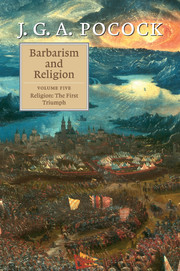Book contents
- Frontmatter
- Contents
- Preface
- Acknowledgements
- Advice to readers
- List of abbreviations
- Introduction
- PART I GIBBON'S ORTHODOX SOURCES
- PART II THE SOURCES OF PROTESTANT ENLIGHTENMENT
- PART III THE TWO CHAPTERS EXPLORED
- 7 The English setting
- 8 Gibbon's fifteenth chapter: the spread of Christianity and the rise of the clergy
- 9 The sixteenth chapter: intolerance, persecution and philosophy
- PART IV CONTROVERSY AND CONTINUATION
- Bibliography
- Index
8 - Gibbon's fifteenth chapter: the spread of Christianity and the rise of the clergy
Published online by Cambridge University Press: 01 March 2011
- Frontmatter
- Contents
- Preface
- Acknowledgements
- Advice to readers
- List of abbreviations
- Introduction
- PART I GIBBON'S ORTHODOX SOURCES
- PART II THE SOURCES OF PROTESTANT ENLIGHTENMENT
- PART III THE TWO CHAPTERS EXPLORED
- 7 The English setting
- 8 Gibbon's fifteenth chapter: the spread of Christianity and the rise of the clergy
- 9 The sixteenth chapter: intolerance, persecution and philosophy
- PART IV CONTROVERSY AND CONTINUATION
- Bibliography
- Index
Summary
THE PROBLEMS OF THE TWO CHAPTERS
The language in which Gibbon introduces his history of Christianity before Constantine is also the language which offended his Christian readers and has established his reputation as a hero of irreligious Enlightenment. It occurs just after the opening of chapter 15 and is repeated here.
Our curiosity is naturally prompted to inquire by what means the Christian faith obtained so remarkable a victory over the established religions of the earth. To this inquiry, an obvious but satisfactory answer may be returned; that it was owing to the convincing evidence of the doctrine itself, and to the ruling providence of its great Author. But as truth and reason seldom find so favourable a reception in the world, and as the wisdom of Providence frequently condescends to use the passions of the human heart, and the general circumstances of mankind, as instruments to execute its purpose; we may still be permitted, though with becoming submission, to ask, not indeed what were the first, but what were the secondary causes of the rapid growth of the Christian Church. It will, perhaps, appear, that it was most effectually favoured and assisted by the five following causes: I. The inflexible, and, if we may use the expression, the intolerant zeal of the Christians, derived, it is true, from the Jewish religion, but purified from the narrow and unsocial spirit, which instead of inviting, had deterred the Gentiles from embracing the law of Moses. II. The doctrine of a future life, improved by every additional circumstance which could give weight and efficacy to that important truth. […]
- Type
- Chapter
- Information
- Barbarism and Religion , pp. 244 - 288Publisher: Cambridge University PressPrint publication year: 2011



